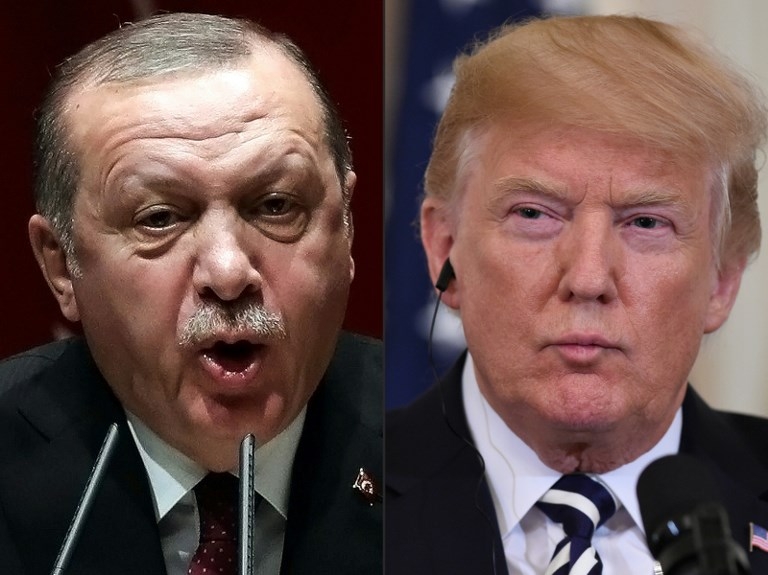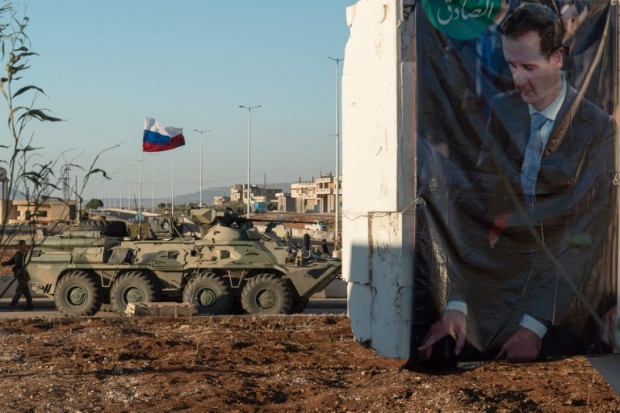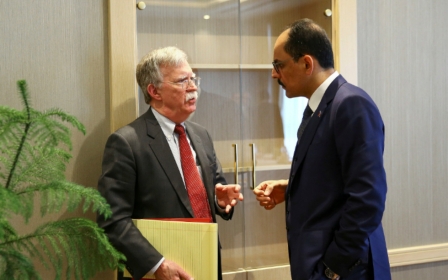Turkey has good reason to be wary of a US withdrawal from Syria

When the US first announced its withdrawal from Syria, this appeared to signal good news for Turkey, enabling it to directly challenge the Kurdish People’s Protection Units (YPG) in northeastern Syria.
This apparent advantage for Turkey was underscored by the US approval to potentially sell a $3.5bn Patriot missile system to Turkey, in a bid to counter a Turkish-Russian arms deal.
News reports suggested that US President Donald Trump’s Syria decision came directly after a phone call with Turkish President Recep Tayyip Erdogan, appearing as a concession to Turkey’s interests.
Yet, it has since become clear that Turkey got much more than it bargained for.
A few days after the announcement, unnamed US and Turkish officials reported that Erdogan had been caught off guard by Trump’s sudden decision, and had actually cautioned against a hasty withdrawal in their phone call.
Erdogan sought to extract some concessions from Trump and to pressure the US to cut its support for the YPG and the Syrian Democratic Forces (SDF).
A riposte to US demands
A wholesale withdrawal, even with sizeable funds and military support to help Turkey continue the role formerly played by the US, was not Ankara’s goal. Even Turkey’s latest declaration that it will advance in the northeast regardless of whether the US withdraws, is not an indication that a full and immediate US withdrawal was the outcome Turkey wanted.
This threat is more likely a riposte to US demands that Kurdish forces should be protected after its own withdrawal.
Turkey has good reason to be wary of a US withdrawal. It then faces the prospect of confronting a newly resurgent Islamic State (IS) on its own. And rather than fighting a weakened and demoralised YPG and SDF, it seems Turkey will more likely face a direct conflict with the Syrian regime, drawing Turkish forces ever deeper into Syrian territory.
Turkey might still be in the anti-Assad camp - for now - but it is certainly not interested in a military confrontation with the Syrian regime
On 28 December, the YPG invited the Syrian army to enter the north to counter Turkey’s incursion, especially in Manbij. With this development, the advantage of the US withdrawal for Turkey was no longer so clear.
Turkey might still be in the anti-Assad camp - for now - but it is certainly not interested in a military confrontation with the Syrian regime.
While Turkey has been a part of the anti-Assad alliance since the start of the conflict, its position has become more tempered as the war has gone on.
Ankara was initially among the most vociferous in calling for the removal of President Bashar al-Assad, and among the staunchest advocates of US military intervention after the chemical weapons attack in Ghouta in 2013. Turkey has also been the biggest base for fleeing Syrian opposition members, with Gaziantep a de facto headquarters for the opposition.
Opportunity for Russia
The increased porousness of the Turkey-Syria border aided the spillover of the conflict into Turkish territory. At the height of the problem, IS was attacking with alarming regularity in Turkey, most devastatingly with a terrorist attack on Ataturk airport in Istanbul in June 2016.
This came after another international relations headache for Turkey, when it shot down a Russian jet in Turkish airspace, triggering a temporary diplomatic and economic boycott by Russia.
As US support for the opposition waned, and as the Syrian regime was increasingly rejuvenated by Russian support, the strength of Turkey’s anti-Assad stance diminished. The clash with Russia, attacks by IS, and increased domestic anger heightened Turkey’s weariness with the conflict.
In late 2016, Russia, Iran and Turkey initiated the Astana talks, which included all three actors, along with the Syrian regime and various Syrian opposition groups - but excluded the US and its allies in Syria, the SDF and YPG.
Now, with the US announcing its withdrawal, Turkey’s options have become narrower and clearer. If the US - in spite of mixed messages from National Security Adviser John Bolton - withdraws, Turkey is unlikely to be able to militarily hold the territory against both IS insurgents and a Syrian-Russian coalition.
It would gain very little from doing so, merely fulfilling US objectives instead of its own. It would not dent Assad’s power, a fading goal now anyway, nor eliminate the Kurdish threat, given the latter’s recent rapprochement with Russia and Syria. It would be a lose-lose situation for Turkey.
Restarting the Astana process
The notion that Turkey poses one of the few remaining obstacles for the Syrian regime, with a potential clash in Turkish-controlled Afrin, is understandable but increasingly unlikely. Turkey prefers to pursue a political route towards its goals, even if it entails closer cooperation with the Syrian regime and its allies.
On its own, without the presence of the US, Turkey poses little threat to Assad or his allies. For example, Turkey reacted to Russian patrols in Manbij by requesting a joint engagement - one way to monitor the Kurds without challenging the Russians.
Erdogan and Russian President Vladimir Putin recently announced they would meet in person this month to restart the Astana process. That, alongside Erdogan’s refusal to meet Bolton when he visited Turkey, was a clear snub to the US.
One question remains: with its increased ties with Russia, can Turkey be sure that Russia will favour Turkish interests above those of its new Kurdish partners?
Turkey also appears to be smoothing relations with Iran, hosting an Iranian state visit in late December with deliberate warmth. Even before this event, Turkey defied US sanctions against Iran, just last week resuming oil imports from Iran.
One question remains: with its increased ties with Russia, can Turkey be sure that Russia will favour Turkish interests above those of its new Kurdish partners? After all, Turkey has been disappointed before on this front by the US.
Marginalising the Kurds
Certainly, Turkey is taking a calculated gamble, but it recognises that Kurdish autonomy is not in the Syrian regime’s interests either.
Turkish realignment away from the US towards Russia constitutes a significant prize for Putin on the global stage; both have something to gain from this development. Thus, Turkey hopes that, eventually, the Kurds will be marginalised in any future settlement, as long as Turkey is present at the negotiating table.
Apart from the US and Russia, the trajectory of Turkey’s role in the Syrian conflict has been pivotal, more so than other opposition allies, such as Saudi Arabia or Qatar. Not only was Turkey the most vocal in its support, it was also better equipped to provide logistical and organisational aid to anti-Assad groups, given its shared border and the fact that it took in the most Syrian refugees.
The political changes in its position - some enforced by Turkey’s own domestic security problems, and some due to its frustration with US unreliability - may eventually have the final say in the direction of Syria’s eight-year conflict.
- Jasmine Gani is a senior lecturer in international relations at the University of St Andrews, and associate director of the Centre for Syrian Studies. She tweets @JKGani.
The views expressed in this article belong to the author and do not necessarily reflect the editorial policy of Middle East Eye.
Photo: Turkish President Recep Tayyip Erdogan and US President Donald Trump are pictured separately in 2018 (AFP)
This article is available in French on Middle East Eye French edition.
New MEE newsletter: Jerusalem Dispatch
Sign up to get the latest insights and analysis on Israel-Palestine, alongside Turkey Unpacked and other MEE newsletters
Middle East Eye delivers independent and unrivalled coverage and analysis of the Middle East, North Africa and beyond. To learn more about republishing this content and the associated fees, please fill out this form. More about MEE can be found here.






